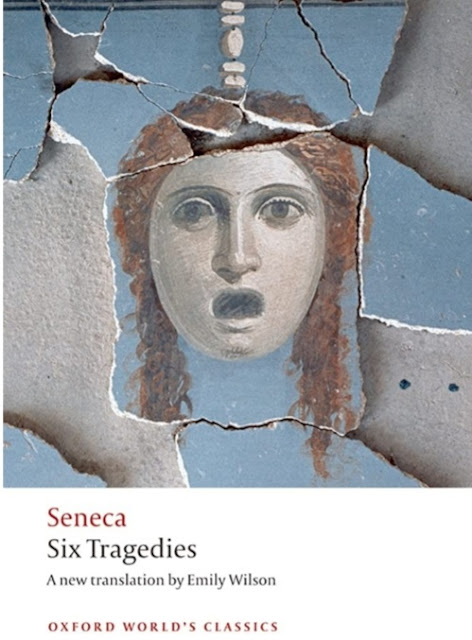Thyestes by Seneca - c. B. C. E. 62- included in the Collection Seneca: Six Tradgedies- translated with an Introduction by Emily Wilson- 2010
Ancient Reads Post
This is the third drama by Seneca I have so far read. Previously I have posted upon his Phaedra as well as Trojan Women.
Lucius Annaeus Seneca
Born- 4 B. C. E. - Cordoba,Spain
49 A. D. Appointed Advisor to Nero
Died 65 A. D - Rome. - ordered to commit suicide for his possible role in a conspiracy to murder Emperor Nero
DRAMATIS PERSONAE-
Thyestes, Brother of Atreus, in exile
Atreus, King of Argos
Tantalus, father of Thyestes
Plisthenes (silent role), son of Thyestes
Tantali umbra (ghost of Tantalus), grandfather of Atreus & Thyestes
Furia (Rage, Fury), often interpreted as Megaera
satelles, attendant or guard of Atreus
nuntius, messenger
Chorus
"Tantalus killed his son, Pelops, and gave him as a feast to the gods. As punishment in the underworld he suffered eternal hunger and eternal thirst, with water and food forever just out of his grasp. The two sons of Pelops struggled for power over the throne of Mycenae. They agreed that whichever of them possessed the golden sheep from Atreus’ herd should be king. Thyestes produced the sheep, and seized power, ousting Atreus. But Atreus accused his brother of plotting with his own wife, Aerope, to steal the fleece and the throne; he seized power in turn, and exiled his brother. Seneca’s play shows what happened when Thyestes returned from exile." From the introduction
The plays of Seneca I have read present a very dark vision. People are motivated by Greed, jealousy, envy and lust. No one can be truly trusted. Love turns to hate to violent revenge. The old Gods are depicted sometimes as cruel, capricious sporting with people just for their own amusement. Sometimes their existence is said to exist only in fairy tales, delusions people cling to for comfort. Roman society was built on a foundation of cruelty and oppression through slavery and warfare. With a turn of fortune today’s aristocrats can become Tommorow's slaves.
Thyestes takes place partially in the Underworld. The summary from Edith Wilson depicts the horrors of the plot.
The sacrificing of children was common in numerous Ancient cultures, including Celtic, old testament Judea, India and Meso-America as well as Grecian. Killing a rival's children was a prime means of revenge.
The next play by Seneca I read will be his Medea but first I will read Medea by Euripides.
"ABOUT EMILY WILSON
Emily Wilson is the College for Women Class of 1963 Term Professor in the Humanities, professor of Classical Studies, and graduate chair of the Program in Comparative Literature & Literary Theory at the University of Pennsylvania. Wilson attended Oxford University (Balliol College B.A. and Corpus Christi College M.Phil.) and Yale University (Ph.D.). In 2006, she was named a Fellow of the American Academy in Rome in Renaissance & Early Modern scholarship. In 2019 she was named a MacArthur Fellow, and in 2020 she was named a Guggenheim Fellow. She lives in Philadelphia with her three daughters, three cats, two rats, and one dog.
Follow Professor Wilson on Twitter @EmilyRCWilson. Professor Wilson frequently tweets about the Odyssey, translation, and her pets." From Emilywilson.com
Reading her bio, I thought I live with my three daughters, five cats and one dog but no rats
Mel u







